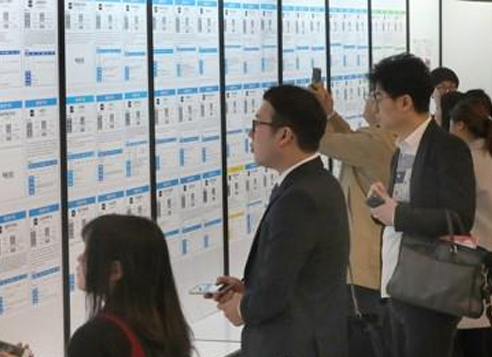Kim Kyung-ho is the Sejong-based business editor of The Korea Herald. He can be reached at khkim@heraldcorp.com -- Ed.Shortly after taking office in May last year, in an initiative that was widely perceived as pro-labor, President Moon Jae-in vowed to turn all temporary jobs in the public sector into permanent positions.
He made the pledge surrounded by workers at Incheon International Airport, saying he would “wipe away the tears from the eyes of non-regular employees.”
That seemingly benign policy, intended to help people worried about job security, is now cited as the cause of rampant hiring irregularities at the country’s public institutions.
Over the past week, a string of disclosures and allegations have been made against public corporations to the effect that they have given unfair advantages to the family members of their employees, notably union members, in the process of granting permanent status to non-regular workers.
The snowballing hiring scandal erupted with an assertion by an opposition lawmaker that nearly 10 percent of the 1,285 contract workers given regular positions by Seoul Metro in March were relatives of the metropolitan subway operator’s employees.
 |
People seeking employment at a job fair in Seoul (Yonhap) |
The number of public institutions found to have been involved in hiring irregularities has so far increased to 13, including the Incheon International Airport Corp., which Moon visited two days after being sworn in. They are suspected of having granted permanent status to 365 temporary workers with family connections to their regular staff.
And, as many people have suggested, these revelations may be the tip of the iceberg, given the massive number of non-regular jobs that have turned into regular ones since the launch of the Moon administration.
According to data from the Ministry of Employment and Labor, more than 85,000 temporary workers were granted permanent status as of the end of August. They were part of about 416,000 people working on a contract basis at 853 public institutions, set to become regular staff members under a three-phase plan drawn up by the ministry in July last year.
The rampant nepotism in the recruitment process at public institutions, which should be fair and transparent, undermines people’s confidence.
The practice, often described by the media as the “hereditary succession of jobs,” is a source of frustration and anger for young job seekers in particular. Despite the Moon administration’s repeated pledges to prioritize job creation, youth unemployment has hit its highest levels in recent months since the late 1990s, when the country was struggling to cope with the fallout from the devastating foreign exchange crisis.
In his inaugural speech, Moon vowed to ensure “equal opportunities, impartial processes and righteous outcomes” for all people. In light of the ongoing hiring scandal, that pledge is likely to ring hollow for most of us.
Opposition parties have seized on the issue to highlight what they see as the Moon government’s ill-conceived employment policy, adopting a joint motion calling for a parliamentary investigation into hiring irregularities at public corporations. The conservative main opposition Liberty Korea Party has gone so far as to point the finger at those close to Moon, Seoul Mayor Park Won-soon and the Korean Confederation of Trade Unions, one of the two major labor umbrella groups.
The liberal ruling Democratic Party of Korea has accused opposition parties of politicizing the issue with irresponsible and groundless allegations, saying the evidence has not yet been examined thoroughly and the reports are unconfirmed.
To show its commitment to clarifying the facts, the ruling party should agree to the proposed parliamentary probe in addition to an internal government investigation. It is likely that its claims that its opponents “have inflated, distorted or exaggerated nonexistent facts” will not hold up.
The government is belatedly moving to tighten guidelines for turning temporary jobs at public institutions into permanent ones. The guidelines announced earlier are largely abstract and ambiguous.
It will not be easy to stem hiring irregularities just by imposing tighter rules. Rather, the Moon government’s push for the indiscriminate transformation of non-regular jobs into regular ones tends to make nepotism more tempting.
Contrary to what Moon and his pro-labor aides seem to believe, it is not in keeping with the global trend to grant regular status to greater numbers of non-regular workers. In the growing gig economy, the proportion of temporary jobs has continued to increase in most advanced countries.
What is more important is to ensure that the same wages will be paid to employees doing the same work regardless of their job status. Moon needs to introduce an equitable wage system, instead of adhering to the slogan of “no non-regular employees” in the public sector.
But doing so would prompt objections from labor groups concerned with protecting the vested interests of their members. The KCTU, which actively supported Moon in last year’s presidential election, is suspected of having expanded its membership by exercising influence over the process of turning non-regular employees into regular staff members.
Since returning home on Sunday from his five-nation tour to Europe, Moon has kept silent on the issue of hiring irregularities -- probably out of embarrassment that his signature labor policy has gone awry.
Moon may opt to follow the line that hiring irregularities at public institutions must be thoroughly investigated and those responsible should be subject to punishment, but that his policy still cannot be called into question. In that case, it is likely he will continue to say that for the remainder of his presidency.
By Kim Kyung-ho (
khkim@heraldcorp.com)








![[Today’s K-pop] Blackpink’s Jennie, Lisa invited to Coachella as solo acts](http://res.heraldm.com/phpwas/restmb_idxmake.php?idx=644&simg=/content/image/2024/11/21/20241121050099_0.jpg)